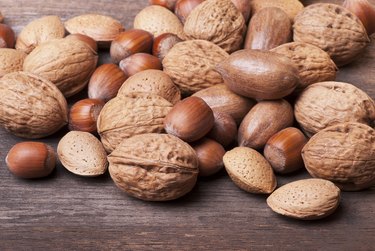
Nuts not only reduce the risk of heart disease, a common complication of diabetes, but also improve blood sugars in people with diabetes. Nuts are filled with beneficial substances responsible for these benefits, including unsaturated fats, plant proteins, fiber, antioxidants, vitamins, minerals and other protective plant chemicals. While any variety of nuts can be a valuable addition to a diabetes food plan, research indicates some nuts may be particularly helpful.
Pistachios
Video of the Day
Pistachios are a beneficial snack for someone with diabetes, according to a 12-week study of 48 people with type 2 diabetes. Compared to study participants who had ate no nuts, those who incorporated 50 grams of pistachios daily, which is a bit more than 1/3 cup, had a 0.4 percent drop in A1c, a measure of average blood sugar readings, and a 14 point drop in fasting blood sugar. Pistachios are rich in magnesium and polyphenols, plant compounds with antioxidant effects, and contain substances which may suppress appetite, foster a slower blood sugar rise after eating, and reduce inflammation, according to study researchers.
Video of the Day
Almonds
Almonds also appear to improve glycemic, or blood sugar control and decrease the risk of heart disease in people with type 2 diabetes. In a 24-week study, participants who included 20 percent of their daily calorie intake from almonds -- or about 1/2 cup whole almonds for a 2000 calorie plan -- lowered their A1c by 0.3%. Almond consumption also decreased waist circumference, suggesting the blood sugar benefit was at least partly related to improved insulin sensitivity from loss of body fat. Researchers also suggest the fiber, plant protein, unsaturated fats, vitamin E, potassium and antioxidants from almonds may improve insulin action in the body.
Walnuts
Data from 2 large prospective studies of US women links walnut consumption with a lower risk of type 2 diabetes. This study associated all nuts with a reduced diabetes risk, but only the consumption of walnuts showed a benefit which was not related to weight loss. While there is little data on the effects of walnuts in people who already have diabetes, the nutritional profile of walnuts suggests this nut may be beneficial in a diabetes food plan. Walnuts are a well-known source of alpha-linolenic acid (ALA), an unsaturated fat which the body can convert into heart-healthy omega-3 fats. Walnuts are also a good source of dietary fiber, antioxidants and plant sterols -- all which may favorably impact insulin action, according to study researchers.
Mixed Nuts
While some nuts seem to be a perfect fit for a diabetes food plan, the lack of large, quality research trials make it difficult to confidently rank one variety over the other. In addition, there's research to suggest that all nuts have benefits. For instance, a study published in the August 2018 issue of Diabetologia examined the role of mixed nuts in the diets of 117 men and women with type 2 diabetes. Study participants who received 1/2 cup of mixed nuts -- unsalted and mostly raw almonds, pistachios, walnuts, pecans, hazelnuts, peanuts, cashews and macadamias -- experienced a small but significant reduction in blood sugar control. Also, a meta-analysis of of 12 randomized, controlled research trials concluded that consumption of 1/2 cup of tree nuts daily improved glycemic control in people with type 2 diabetes.
Precautions
Nuts can be a healthful addition to a food plan for diabetes, but their inclusion may not be for everyone. If you have an allergy to any type of nut or legume, be sure to understand which, if any, nuts you can safely include in your diet. Also, nuts are a high calorie food, with 1/2 cup nuts providing as much as 450 calories, so it may work best if the nuts replace high calorie foods, rather than simply being added to your usual diet. If you plan to add more nuts to your diabetes food plan and want to ensure you don't gain weight, or if you want to learn more about using diet and nutrition to manage diabetes or other health conditions, ask your doctor for a referral to a dietitian.
Reviewed by Kay Peck, MPH RD
- PLOS One: Effect of Tree Nuts on Glycemic Control in Diabetes: A Systematic Review and Meta-Analysis of Randomized Controlled Dietary Trials
- Diabetologia: Nuts as a Replacement for Carbohydrates in the Diabetic Diet: A Reanalysis of a Randomised Controlled Trial
- The Journal of Nutrition: The Role of Tree Nuts and Peanuts in the Prevention of Coronary Heart Disease: Multiple Potential Mechanisms
- The Review of Diabetic Studies: Effects of Pistachio Nut Supplementation on Blood Glucose in Patients with Type 2 Diabetes: A Randomized Crossover Trial
- Metabolic Syndrome and Related Disorders: Effect of Almond Supplementation on Glycemia and Cardiovascular Risk Factors in Asian Indians in North India with Type 2 Diabetes Mellitus: A 24–Week Study
- The Journal of Nutrition: Walnut Consumption Is Associated with Lower Risk of Type 2 Diabetes in Women
- National Institutes of Health Office of Dietary Supplements: Omega-3 Fatty Acids